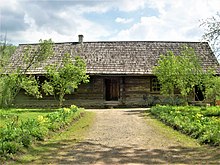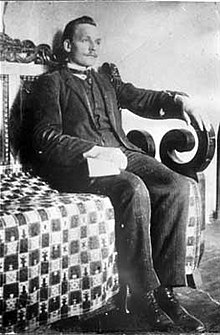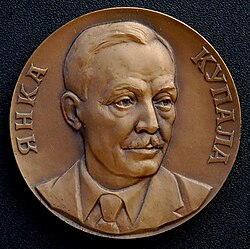Yanka Kupala
show This article may be expanded with text translated from the corresponding article in Belarusian (Taraškievica orthography). (February 2021) Click [show] for important translation instructions. |
show This article may be expanded with text translated from the corresponding article in Russian. (February 2021) Click [show] for important translation instructions. |
Janka Kupala Янка Купала | |
|---|---|
 | |
| Born | July 7 [O.S. June 25] 1882 Viazynka, Minsk Governorate, Russian Empire |
| Died | 28 June 1942 (aged 59) Moscow, Soviet Union |
| Occupation | Poet and writer |
| Nationality | Belarusian |
| Period | 1903–1942 |
Yanka Kupala, also spelled Janka Kupała (Belarusian: Янка Купала; July 7 [O.S. June 25] 1882 – 28 June 1942), was the pen name of Ivan Daminikavič Lutsevič (Іван Дамінікавіч Луцэвіч), a Belarusian poet and writer.
Biography[]
This section does not cite any sources. (February 2017) |
Early life[]


Kupala was born on July 7, 1882, in Viazynka, a folwark settlement near Maladzyechna. His family was noble, although both of his parents were employed as tenant farmers at the folwark. Kupala was thus essentially born into a landless peasant class. He received a traditional Belarusian education, completing his studies in 1898. Following the death of his father in 1902, Kupala worked a variety of short-term jobs, including as a tutor, a shop assistant, and a record keeper.
Kupala's first serious literary attempt was Ziarno, a Polish-language sentimental poem which he completed around 1903–1904 under the pseudonym "K-a." His first Belarusian-language work ("Мая доля") was dated July 15, 1904. Kupala's first published poem, "Мужык" ("Peasant"), was published approximately a year later, appearing in Belarusian in the Russophone Belarusian newspaper Severo-Zapadnyi Krai (Northwestern Krai) on May 11, 1905. A number of subsequent poems by Kupala appeared in the Belarusian-language newspaper Nasha Niva from 1906 to 1907.[1]
Personal life[]
The names of two women are still remembered when it comes to Yanka Kupala’s personal life: Vladislava Stankevich ( and . At the age of 16, she went to Vilnya (Vilnius) in search of a better life. She met Yanka Kupala in 1909 at her friends’ house. From her memoir Сцежкамі жыцця (Paths of life):
"Kupala was making jokes, asking if there are many beautiful girls in Vilnya. I frowned and kept silent, unhappy with the playful nature of the conversation."
The encounter with Paulina Miadzelka sank so deep into Kupala’s mind that in four years he named his new play Paulinka and even invited Paulina Miadzelka to play a lead role in the similarly-named amateur play. The aspiring actress accepted the offer and kept communicating with the author, even though during one of the meetings she pushed him back with words “Are you coming here to teach me how to kiss? I can manage without your lessons.”[citation needed]
Yanka Kupala married Vladislava Stankevich in 1916 in . There is a comment in Paulina Miadzelka’s memoir that she learned about the marriage of Yanka Kupala and her friend only in a year after the ceremony. The marriage of Yanka Kupala and Vladislava Lutsevich lasted for over 25 years. When the poet died in 1942, his always energetic wife took it very heavily. She decided to devote her life to preserving the memory of the great poet. It was Vladislava Lutsevich[2] who created and became the director of the in Minsk.
In Vilnius and St. Petersburg[]

Kupala moved to Vilnius in 1908, where he continued with his career as a poet. The same year the first published collection of his poems, Жалейка (The Little Flute) brought on the ire of the czarist government, which ordered the book confiscated as an anti-government publication. The order for Kupala's arrest was revoked in 1909, but a second printing was again confiscated, this time by the local authorities in Vilnius. He ceased working for the Nasha Niva in order to avoid ruining the reputation of the newspaper.
Kupala left for Saint Petersburg in 1909. The subsequent year saw the publication of several works, including the poem Адвечная песьня (Eternal Song), which appeared as a book in St. Petersburg in July 1910. Сон на кургане (Dream on a Barrow)– completed in August 1910 –symbolised the poor state of Kupala's Belarusian homeland. He left St. Petersburg and returned to Vilnius in 1913. Among those influencing Kupala in the 1910s was Maxim Gorky.
During the Soviet period[]
Kupala's writing changed to an optimistic tone following the Great October Revolution of 1917. Among Kupala's numerous translations into the Belarusian language were the internationalist-Marxist anthem The Internationale and an ancient epic poem The Tale of Igor's Campaign (translated in 1921).[3][4] Nevertheless, Kupala maintained his connections with the anti-Soviet oriented nationalist emigres of the Belarusian People's Republic, who exhorted that he join them in exile in Czechoslovakia during a trip abroad in 1927. At home, the newly established authorities considered him with some distrust–at times, criticism of Kupala in the press mounted insofar as his activities were regarded as too oriented around nationalism. This period stopped once he printed a public letter of apology in the 1930s.[citation needed]
Kupala was awarded the Order of Lenin in 1941 for the poetry collection Ад сэрца (From the Heart). With the Occupation of Belarus by Nazi Germany in 1941, because of being very ill he moved to Moscow and then to Tatarstan.[citation needed] Even from there he wrote poems supporting the Belarusian partisans fighting against Nazi Germany. He died in Moscow in 1942, aged 59, having fallen down the stairwell in Hotel Moskva.[citation needed]
Legacy[]

Kupala became recognised as a symbol of culture of Belarus during the Soviet era. A museum, organised in Minsk through the efforts of his widow in 1945, is the leading literary museum in Belarus. Hrodna State University was named after Yanka Kupala. There is also a park named after him with a monument to the poet, a theatre and a metro station (Kupalaŭskaja) in Minsk.
At the Arrow Park in Monroe, New York there is a monument of Yanka Kupala that was created by Belarusian sculptor Anatoly Anikeichik and architect Sergey Botkovsky. Since 1973 it is presented to the American Side.[5] A monument to Kupala is placed on a square in the city of Ashdod in Israel.
References[]
- ^ Yanka Kupala: personality and work
- ^ Жена Янки Купалы была характером в мать-француженку, а внешностью - в отца-белоруса
- ^ "The tale of Igor's campaign".
- ^ Виктор Корбут. "Исполнилось 90 лет первому переводу "Слова о полку Игореве" на белорусский язык" [the first translation of The Tale of Igor's Campaign into Belarusian was made 90 years ago] (in Russian). Российская газета.
- ^ Flowers laid at Yanka Kupala monument in Arrow Park, Monroe, New York
External links[]
| Wikimedia Commons has media related to Yanka Kupala. |
- Janka Kupala's sonnets translated by Vera Rich
- 1882 births
- 1942 deaths
- People from Maladzyechna District
- People from Minsky Uyezd
- Members of the Supreme Soviet of the Byelorussian SSR (1938–1946)
- 20th-century Belarusian poets
- Belarusian writers
- Soviet poets
- Soviet male writers
- 20th-century male writers
- Belarusian-language writers
- Belarusian male poets
- Socialist realism writers
- Stalin Prize winners
- Recipients of the Order of Lenin